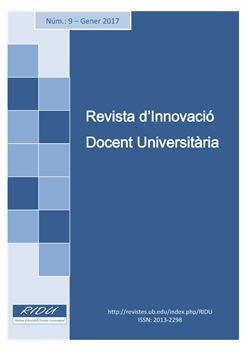Guidance resources for academic transition and decision making of students: the program “University for a Day”
DOI:
https://doi.org/10.1344/RIDU2017.9.3Keywords:
Transition to university, Adaptability skills, Academic socialization, Formative and professional project, Decision making.Abstract
The difficulties showing the newly admitted students to adapt to university education, has come to emphasize the need to implement preventive programs Guidance, which give meaning and coherence to the different academic paths. Studies so far have shown that many students are not prepared for the transition to higher education and have serious difficulty staying on the degree chosen, which means that in many cases, end up failing or leaving college. To address this problem the program was created "University for a day, Ux1d", in order to prevent false expectations of higher education, develop skills of adaptability, help define the training project and promote responsible decision-making. The results showed a high evaluation of the program, since all participants (high school students, students, tutors, counselors and university professors) felt that had been a constructive experience to prepare academic socialization and adaptation access to higher education. Through activities, an approach of high school students to college life was achieved, which could prevent future imbalances.
References
Alonso, P., Lobato, H. (2005) Elementos que influyen en el fracaso universitario: un estudio descriptivo. Revista Española de Orientación y Psicopedagogía, 16(1), pp. 63-79.
Álvarez, M., Figuera, P., Torrado, M. (2011) La problemática de la transición bachillerato-universidad en la Universidad de Barcelona. Revista Española de Orientación y Psicopedagogía, 22(1), pp. 15-27.
Álvarez, P. (2002) La función tutorial en la universidad; una apuesta por la mejora de la calidad de la enseñanza. EOS, Madrid.
Álvarez, P. (2014) La función tutorial del profesorado universitario: una nueva competencia de la labor docente en el contexto del EEES. Revista Portuguesa de Pedagogía, 47(2), pp. 85-106.
Álvarez, P. (coord.) Alegre, O.M., Castro, J.F., Castro, F.M., Sanabria, A., López, D., Abad, M. (2012). Tutoría universitaria inclusiva. Narcea, Madrid.
Álvarez, P., López, D. (2011) El absentismo en la enseñanza universitaria: un obstáculo para la participación y el trabajo autónomo del alumnado. Bordón, 63(3), pp. 41-54.
Álvarez, P, Cabrera, L., González, M., Bethencourt, J. (2006) Causas del abandono y prolongación de los estudios universitarios. Paradigma, 27(1), pp. 7-36.
Álvarez, V. (1999) Profundizando en la calidad de la enseñanza. Aportaciones de los profesores mejor evaluados de la Universidad de Sevilla. Universidad de Sevilla, Sevilla.
Bethencourt, J.T., Cabrera, L., Hernández, J., Álvarez, P., González, M. (2008) Variables psicológicas y educativas en el abandono universitario. Revista Electrónica de Investigación Psicoeducativa, 18, pp. 603-622.
Echeverría, B. (coord.) (2008) Orientación Profesional. UOC, Barcelona.
Fernández, J. (1995) El trabajo docente y psicopedagógico en Educación secundaria. Aljibe, Málaga.
Figuera, P., Forner, A., Dorio, I. (2003) Las competencias académicas previas y el apoyo familiar en la transición a la universidad. Revista de Investigación Educativa, 21(2), pp. 349-369.
Gairín, J., Figuera, P., Triadó, X. (2010) L’abandonament dels estudiants a les universitats catalanes. Agència de Qualitat Universitària, Barcelona.
Gámez, E., Marrero, H. (2003) Metas y motivos en la elección de la carrera universitaria: Un estudio comparativo entre psicología, derecho y biología. Anales de Psicología, 19(1), pp. 121-131.
González, M., Álvarez, P., Cabrera, L., Bethencourt, J. (2007) El abandono de los estudios universitarios: factores determinantes y medidas preventivas. Revista Española de Pedagogía, LXV(236), pp. 71-85.
Guichard, J. (2002) Problemáticas y finalidades de la orientación profesional. Revista Europea de Formación Profesional, 26, pp. 5-20.
Lapan, R.T., Gysbers, N.C., Petrosky, G.F. (2001) Helping seventh graders be safe and successful: A statewide study of the impact of comprehensive guidance and counseling programs. Journal of Counseling and Development, 79(3), pp. 320-330.
Lent, R.W., Brown, S., Hackett, G. (1994) Toward a unifying social cognitive theory of career and academic interest, choice, and performance. Journal of Vocational Behavior, 45, pp. 79-122.
Mosca, A., Santiviago, C. (2010) Conceptos y herramientas para aportar a las elecciones vocacionales ocupacionales de los jóvenes. UdelaR, Montevideo.
OCDE (2004) Orientación profesional y políticas públicas. Como acortar distancias. Ministerio de Educación y Ciencia, Madrid.
Pascarella, E., Terenzini, P. (2005) How college affects students: a third decade of research. Jossey-Bass, San Francisco, C.A.
Rodríguez, M.L. (2003) Cómo orientar hacia la construcción del proyecto profesional. Autonomía individual, sistema de valores e identidad laboral de los jóvenes. Desclée Brouwer, Bilbao.
Rodríguez, S., Fita, E., Torrado, M. (2004) El rendimiento académico en la transición secundaria-universidad. Revista de Educación, 334, pp. 391-414.
Romero, S. (2009) El proyecto profesional y vital. En: L. Sobrado y A. Cortés. Orientación Profesional. Nuevos escenarios y perspectivas. Biblioteca Nueva, Barcelona.
Ryan, M.P., Glenn, P.A. (2003) Increasing one-year retention rates by focusing on academic competence: An empirical odyssey. Journal of College Student Retention, 4(3), pp. 297-324.
Savickas, M.L. (2005) The theory and practice of career construction. En: S.D. Brown y R.W. Lent (eds.), Career Development and Counseling: Putting theory and research to work (pp. 42-70). John Wiley & Sons, Inc, New Jersey.
Downloads
Published
Issue
Section
License
Authors whishing to publish in this journal agree to the following conditions:
- The author or author retain copyright and grants the journal the right of first publication of the paper.
- The texts will be published under license "Reconocimiento Creative Commons 4.0 España", which allows to share, distribute, reproduce and the public communication of the paper, as long as the name of the author or authors and the journal are clearly stated.







